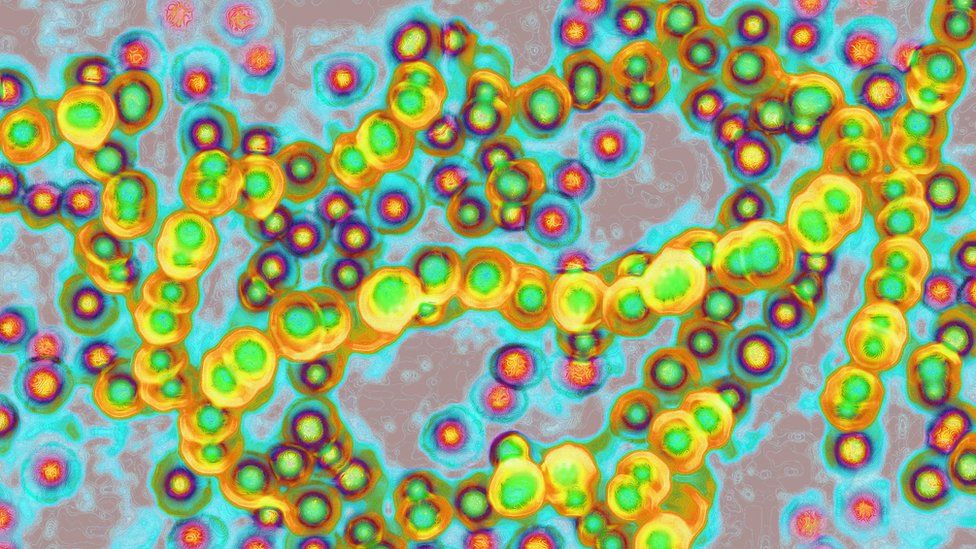ARTICLE AD BOX
 Image source, BSIP/Getty Images
Image source, BSIP/Getty Images
By Michelle Roberts
Digital health editor
A 12-year-old child, who was a pupil at Colfe's School in Lee, London, has died from Strep A bacterial infection.
Deaths like this are rare, but six other UK children have also lost their lives in recent weeks.
Of the six deaths since September, five were under-fives in England. The other one was a seven-year-old in Wales.
Reports say there are eight cases in Scotland, but no deaths. It is not known whether there are any ongoing cases in Wales and Northern Ireland.
Headmaster of Colfe's School Richard Russell said: "This wholly unexpected tragedy has affected all members of the school community, including pupils, parents and staff. We are doing what we can to support the pupil's family who are seeking to come to terms with their devastating loss."
Health experts say parents and doctors need to be vigilant and have a low bar for treating the contagious disease that is circulating earlier than usual this year.
The UK should expect many more cases of Strep A over the coming weeks.
Most Strep A infections are mild and get better with antibiotics. But some people who catch it can get very sick.
'Devastating'
Four-year-old Camila Rose Burns is critically ill and on a ventilator in hospital because of a severe Strep A infection, known as invasive group A Strep (iGAS).
Her father, Dean Burns, from Liverpool, told the BBC's Today programme: "She is still fighting for her life. She is really poorly, it is just devastating to us as a family. We can't believe this has happened.
Image source, Dean Burns
Image caption,Dean Burns wants parents to be aware of the signs and symptoms
"It progressed to something called invasive group A Strep, which has now gone into her bloodstream and has devastated her body.
"I'm at a loss with it all, I just want our family back. The pain is unimaginable. She is just so beautiful and precious. She is just our special little girl."
Infections starting early
The UK Health Security Agency's (UKHSA) chief medical adviser, Dr Susan Hopkins, said: "We are concerned, and concerned enough to ensure that we wanted to make the public aware of the signs and symptoms that they should watch out for and of course to alert clinicians to prescribe antibiotics for these conditions."
She says an early start to the Strep A infections season in the UK could be a side effect of the easing of pandemic restrictions.
"We are back to normal social mixing and the patterns of diseases that we are seeing at the moment are out of sync with the normal seasons, as people mix back to normal and move around and pass infections on."
Strep A can cause a range of illnesses. Most cases are mild - a sore throat or a skin infection that can be easily treated with antibiotics.
Some people develop scarlet fever, which causes a skin rash (that feels like sandpaper) and flu-like symptoms, including a high temperature.
Very rarely, Strep A can cause something called invasive group A streptococcal infection or iGAS, which can be deadly.
Invasive disease happens when the bacteria get past your body's immune defences.
Warning signs of invasive disease include:
- fever (a high temperature above 38C)
- severe muscle aches
Urgent, early medical help is essential.
The UKHSA advises that anyone with a high fever, severe muscle aches, pain in one area of the body and unexplained vomiting or diarrhoea should call NHS 111 and seek medical help immediately.
Strep A can be treated with antibiotics.
Prof Jim McManus, current president of the Association of Directors of Public Health, said the UK should expect more cases: "It is a function of numbers. There are many more cases of group A Strep around, and because there are many more cases, the number of severe cases will rise.
"We had four deaths in 2017-18," he added, comparing that figure to this year's total.
"It is a case for real vigilance. We seem to have forgotten that Strep A is around, so we have to think Strep A when children present with symptoms that could be Strep A. In some cases perhaps we had thought this had gone away because we had been thinking about other infections."
As a parent, if you feel that your child seems seriously unwell, you should trust your own judgement. Contact NHS 111 or your GP if:
- your child is getting worse
- your child is feeding or eating much less than normal
- your child has had a dry nappy for 12 hours or more or shows other signs of dehydration
- your baby is under three months old and has a temperature of 38°C, or is older than three months and has a temperature of 39°C or higher
- your baby feels hotter than usual when you touch their back or chest, or feels sweaty
- your child is very tired or irritable
Call 999 or go to A&E if:
- your child is having difficulty breathing - you may notice grunting noises or their tummy sucking under their ribs
- there are pauses when your child breathes
- your child's skin, tongue or lips are blue
- your child is floppy and will not wake up or stay awake

 2 years ago
46
2 years ago
46








 English (US) ·
English (US) ·